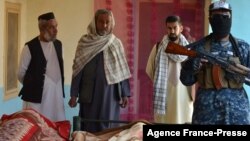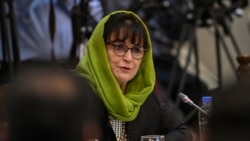The United Nations top diplomat in Afghanistan urged the international community on Wednesday to pay greater attention to the rise of the so-called Islamic State in Afghanistan, saying the terror group is taking advantage of continuing instability to expand its presence in the country.
“Once limited to a few provinces and Kabul, ISIL-KP now seems to be present in nearly all provinces and increasingly active,” U.N. envoy Deborah Lyons told a meeting of the U.N. Security Council, using an acronym for the Islamic State Khorasan Province.
She said attacks are up significantly — 334 this year, compared with 60 in 2020, all attributed to or claimed by IS Khorasan. Many of the attacks have targeted Shiites.
“The Taliban insist that they are waging a concerted campaign against ISIL-KP, but this campaign is worrying as it appears to rely heavily on extrajudicial detentions and killings of suspected ISIL-KP members,” Lyons said. “This is an area deserving of more attention from the international community.”
The terror group has intensified bombings and other attacks since the Taliban seized power in mid-August.
U.S. military officials have been warning for months that there is a danger of IS Khorasan and al-Qaida regrouping and reemerging in a weakened Afghanistan.
On engagement with the Taliban, Lyons said it has been “generally useful and constructive” and that the Taliban have assured the United Nations that they want it to stay and assist the population.
‘Humanitarian catastrophe’
Afghanistan was in a humanitarian crisis before the government fell to the Taliban. Years of conflict, drought and corruption had left millions in poverty and displaced.
With the economy dependent on foreign development aid, which has been largely suspended while the international community assesses whether the Taliban can be a reliable partner, the humanitarian situation has steadily unraveled and the U.N. says 23 million people in a country of 38 million need some form of assistance.
“We are on the brink of a humanitarian catastrophe, but we are on the brink of a humanitarian catastrophe that is preventable,” Lyons said.
While she did not explicitly call for the lifting of international sanctions or the unfreezing of funds, she pointed to their role in the gradual economic collapse.
“An entire complex social and economic system is shutting down, in part due to the asset freeze, the suspension of non-humanitarian aid flows, and sanctions,” the U.N. envoy said.
Russia and China urged the unfreezing of Afghanistan’s internationally held cash.
“The frozen Afghan assets should be returned to the true owners as soon as possible, and cannot be used as bargaining chip or threat or for coercion,” China’s U.N. envoy Zhang Jun said.
US aid
The United States, which completed its withdrawal from the country in August, has contributed $474 million this year in humanitarian assistance.
“And although we and many others are rightly seized with Afghanistan’s humanitarian needs, we continue to pay close attention to whether the Taliban is demonstrating compliance with its commitments on counterterrorism, respect for human rights, and inclusivity,” U.S. Ambassador Jeffrey DeLaurentis told the council.
The Taliban government has not won any formal international recognition, and it is still represented at the United Nations by the previous government’s envoy.
“The situation in Afghanistan is extremely fragile,” Ambassador Ghulam Isaczai said. “It is only through an inclusive government we can safeguard against a new civil war along ethnic lines and the use of Afghan territory by foreign terrorist outfit, as well as making a transition from a perpetual state of humanitarian crisis to a more stable economy.”
He expressed support for reviving the Doha peace process and the holding of an international peace conference.
On the humanitarian situation, he appealed for generous international support, but stressed funding should not go directly to the Taliban.
Iran, Tajikistan and Pakistan also addressed the council as concerned neighbors.
Pakistan, which has had a warm relationship with the Taliban, said the new authorities are “responding positively” to engagement with the international community.
“The nightmare scenarios that were feared after 15 August have not come to pass,” Ambassador Munir Akram told the council. “There has been no widespread violence or violations of human rights in Afghanistan.”
He said the security situation is “vastly improved” and girls schools are open except for secondary schools. He said the Taliban say that is because of a lack of teachers and their inability to find the cash to pay them.
“The glass may yet be half full, yet engagement has yielded progress,” Akram said.
The Pakistani diplomat also took a swipe at his Afghan counterpart, saying the council might benefit more from “hearing from those actually ruling Kabul.”





